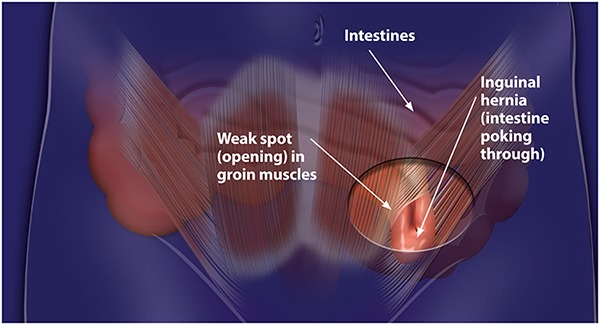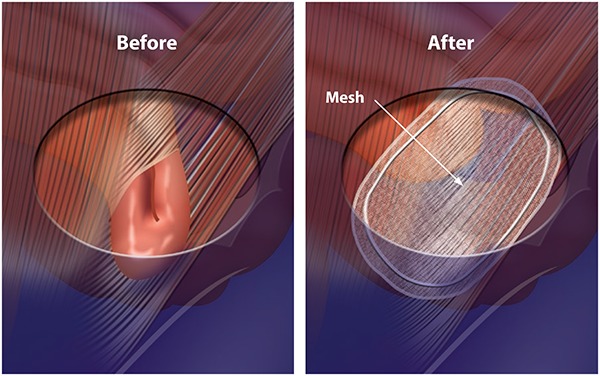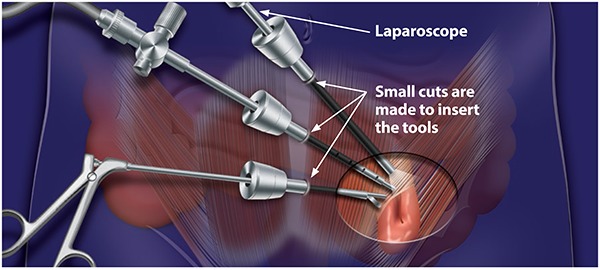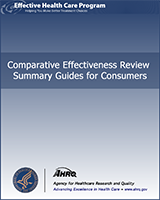NCBI Bookshelf. A service of the National Library of Medicine, National Institutes of Health.
Comparative Effectiveness Review Summary Guides for Consumers [Internet]. Rockville (MD): Agency for Healthcare Research and Quality (US); 2005-.
This publication is provided for historical reference only and the information may be out of date.
Is This Information Right for Me?
Yes, this information is right for you if
- Your doctor* has said that you have an inguinal hernia (pronounced IN-gwen-ul HER-nee-uh), also sometimes called a groin hernia. An inguinal hernia is a condition in which part of your intestine, other organs, or belly fat pokes through an opening or weak spot in the muscles in your groin.
- You want to know what research says about surgery to fix an inguinal hernia.
- You are over age 18. The information in this summary is from research on adults.
No, this information is not right for you if
- Your doctor has told you that you have a type of hernia other than an inguinal hernia. If you are not sure what kind of hernia you have, ask your doctor.
What will this summary tell me?
This summary will tell you what research says about the benefits and risks of open surgery and laparoscopic (pronounced lah-puh-ruh-SKAHP-ik) surgery to fix an inguinal hernia. It can help you talk with your doctor about whether surgery is right for you and, if so, which type of surgery might be best for you. This summary does not discuss how to prepare for surgery to fix an inguinal hernia or what to expect after surgery.
Where does the information come from?
Researchers funded by the Agency for Healthcare Research and Quality (AHRQ), a Federal Government research agency, reviewed 151 studies published between January 1990 and November 2011 on surgery to fix an inguinal hernia. The report was reviewed by clinicians, researchers, experts, and the public. You can read the report at www.effectivehealthcare.ahrq.gov/inguinal-hernia.cfm.
Note: The typical adult in the research studies for this summary was a man:
- Of normal weight to slightly overweight
- In his mid 50s
- With an inguinal hernia on only one side of his groin
- Who was having his first hernia on that side of his groin
- And who did not require emergency hernia surgery
For this reason, the research information in this summary may not apply to women, men in other age groups, or people who need emergency surgery to fix their hernia.
Understanding Your Condition
What is an inguinal hernia?
An inguinal hernia is a condition in which part of your intestine, other organs, or belly fat pokes through an opening or weak spot in the muscles in your groin. Anyone can get an inguinal hernia—from infants to adults. But it is much more common in men than in women.
Symptoms of an inguinal hernia can include:
- A bulge on one or both sides of your groin (the bulge may appear or disappear when you change positions or lie down)
- In men, the scrotum (the sac that holds the testicles) may become swollen or enlarged
- A burning feeling or pain in the area of the bulge, especially when lifting or straining
Sometimes the bulge of an inguinal hernia is painful, and sometimes it is not. Often, gently pushing on the bulge can make the intestine go back into your belly. Sometimes, however, the intestine can become trapped in the groin or scrotum and cannot be pushed back in.

What if my intestine becomes trapped?
If part of your intestine becomes trapped and cannot be pushed back in, it can affect your intestine’s ability to move gas and stool (waste) through and out of your body. This can cause you to feel constipated. If you think your hernia may be trapped, call your doctor.
In a trapped hernia, the blood supply to the piece of intestine poking through can become cut off (a condition called a “strangulated” hernia). Without blood, the piece of intestine could die and would then have to be removed in an emergency surgery. A strangulated hernia requires emergency medical attention.
Symptoms of a strangulated hernia include:
- The bulge becomes very tender and red
- Pain that gets worse all of a sudden
- Fever
- A fast heartbeat
- Nausea
- Vomiting
Warning: A strangulated hernia is a serious condition and could be life threatening without surgery to fix the inguinal hernia. If you think you may have a strangulated hernia, you should call your doctor or go to the hospital right away.
What causes an inguinal hernia?
Inguinal hernias can be caused by several things. One possible cause is a weak spot in your groin muscles from when you were born. Another possible cause is repeated strain on your groin muscles. Things that could cause strain include lifting heavy objects, pushing hard while going to the bathroom (possibly because of constipation), gaining weight, or coughing a lot.
How common are inguinal hernias?

Out of every 100 men, 25 will have an inguinal hernia sometime during their lifetime

Out of every 100 women, 2 will have an inguinal hernia sometime during their lifetime
- The risk of inguinal hernia increases with age.
- Surgery to fix a hernia is one of the most common types of surgery done in the United States.
Understanding Your Options
How is an inguinal hernia treated?
The only way to fix an inguinal hernia is with surgery. If your hernia is not painful, is not getting larger, and is not trapped, you may choose to wait to have surgery. If you choose to wait, your doctor will watch your hernia to make sure it does not get worse or become trapped. There are benefits and risks with both waiting and surgery. You should discuss both options with your doctor.
If you decide to have surgery to fix your inguinal hernia, there are two ways to do the surgery: open surgery or laparoscopic (pronounced lah-puh-ruh-SKAHP-ik) surgery.
Open Surgery
In an open surgery, the surgeon makes a cut in your groin and moves your intestine, other organs, or belly fat back into your belly. The surgeon then closes up the weak spot in your groin muscles with stitches. Usually the surgeon will cover the weak spot with a small piece of mesh before stitching it closed to provide extra support.


Laparoscopic Surgery
In laparoscopic surgery, the surgeon uses a tool called a laparoscope (pronounced LAH-pruh-skohp). A laparoscope is a thin tube with a tiny camera that the surgeon puts through small cuts in your belly along with other small tools to do the surgery. The laparoscope lets the surgeon see inside your body and fix the hernia without having to make a big cut. After moving your intestine, other organs, or belly fat back into your belly, the surgeon will cover the weak spot with a small piece of mesh to make it stronger.
What are the risks of surgery for an inguinal hernia?
Surgery to fix an inguinal hernia is generally safe, and complications are rare. However, possible risks include:
- Bleeding
- Infection
- Long-term pain
- A scar
- Injury to organs (such as the intestines, bladder, or others)
- Injury to the blood vessels (on the side of your groin where you are having surgery) that supply the testicle with blood
- Injury to the tube (on the side of your groin where you are having surgery) that carries semen (fluid containing sperm) from the testicle to the penis
- Risks of general anesthesia, such as pneumonia or blood clots, although these risks are rare
Note: After surgery to fix an inguinal hernia, there is a chance that the hernia could come back. The chance of an inguinal hernia coming back varies and may be affected by many things, including whether you have open or laparoscopic surgery and your surgeon’s experience with that type of surgery.
What does research say about surgery for an inguinal hernia?
Both open and laparoscopic surgery work to fix an inguinal hernia. The chart below compares the possible benefits and risks of open and laparoscopic surgeries.
| For people with their first inguinal hernia* |
|---|
| Open Surgery |
|
| Laparoscopic Surgery |
|
| Researchers also found: |
|
| For people who have an inguinal hernia that has come back** |
| Laparoscopic Surgery |
|
- *
You may have had an inguinal hernia on the other side of your groin, but this is the first time you have had one on this side.
- **
You have an inguinal hernia on one or both sides of your groin that was fixed and has come back in the same spot.
Making a Decision
What should I think about when deciding?
There are several things to think about when deciding if surgery to fix your inguinal hernia is right for you and, if so, which type of surgery to have. You may want to talk with your doctor about:
- How much pain you have
- How active you are—the more active you are, the more likely it is that your hernia could get larger or worse without treatment
- The risk of your intestine becoming trapped or strangulated
- The possible benefits and risks of surgery
- If your inguinal hernia is not painful, the trade-offs between the possible benefits of surgery and the possible risks, such as long-term pain after surgery
- If you decide to have surgery, which type of surgery best fits your preferences—open surgery or laparoscopic surgery
- Your surgeon’s experience with each type of surgery
- The amount of time you will have to stay in the hospital and be away from work and other daily activities after surgery
- The costs of surgery
What are the costs of surgery?
The costs to you for surgery to fix an inguinal hernia depend on your health insurance and the type of surgery done.
Ask your doctor
- Do I need surgery to fix my inguinal hernia now or can I wait?
- Do any of my other health conditions affect my ability to have surgery?
- If I decide to wait, are there activities I should avoid to keep my hernia from getting worse?
- If I wait, what signs should I watch for that my hernia is getting worse?
- If I decide to have surgery, which type is best for me—open or laparoscopic surgery?
- Do you do both open and laparoscopic surgeries for inguinal hernias? Which type of surgery do you have more experience with?
- How long will it take to recover from surgery? When can I return to work and physical activities?
- How will surgery affect my lifestyle? What should I avoid right after surgery?
- What can I do to help keep my inguinal hernia from coming back?
Source
The information in this summary comes from the report Surgical Options for Inguinal Hernia: Comparative Effectiveness Review, August 2012. The report was produced by the ECRI Institute Evidence-based Practice Center through funding by the Agency for Healthcare Research and Quality (AHRQ).
For a copy of the report, or for more information about AHRQ and the Effective Health Care Program, go to www.effectivehealthcare.ahrq.gov/inguinal-hernia.cfm. Additional information came from the MedlinePlus® Web site, a service of the National Library of Medicine and the National Institutes of Health. This site is available at www.nlm.nih.gov/medlineplus.
This summary was prepared by the John M. Eisenberg Center for Clinical Decisions and Communications Science at Baylor College of Medicine, Houston, TX. Patients with an inguinal hernia reviewed this summary.
Footnotes
- *
In this summary, the term “doctor” refers to the health care professionals who may take care of you, including your physician, nurse practitioner, or physician assistant.
- Review Antipsychotic Medicines for Treating Schizophrenia and Bipolar Disorder: A Review of the Research for Adults and Caregivers.[Comparative Effectiveness Revi...]Review Antipsychotic Medicines for Treating Schizophrenia and Bipolar Disorder: A Review of the Research for Adults and Caregivers.John M. Eisenberg Center for Clinical Decisions and Communications Science. Comparative Effectiveness Review Summary Guides for Consumers. 2005
- Review Treatments for Open-Angle Glaucoma: A Review of the Research for Adults.[Comparative Effectiveness Revi...]Review Treatments for Open-Angle Glaucoma: A Review of the Research for Adults.John M. Eisenberg Center for Clinical Decisions and Communications Science. Comparative Effectiveness Review Summary Guides for Consumers. 2005
- Review Medicines for Rheumatoid Arthritis: A Review of the Research for Adults.[Comparative Effectiveness Revi...]Review Medicines for Rheumatoid Arthritis: A Review of the Research for Adults.John M. Eisenberg Center for Clinical Decisions and Communications Science. Comparative Effectiveness Review Summary Guides for Consumers. 2005
- Laparoscopic versus Open Repair of Para-Umbilical Hernia- A Prospective Comparative Study of Short Term Outcomes.[J Clin Diagn Res. 2017]Laparoscopic versus Open Repair of Para-Umbilical Hernia- A Prospective Comparative Study of Short Term Outcomes.Korukonda S, Amaranathan A, Ramakrishnaiah VPN. J Clin Diagn Res. 2017 Aug; 11(8):PC22-PC24. Epub 2017 Aug 1.
- Review Medicines for Psoriatic Arthritis: A Review of the Research for Adults.[Comparative Effectiveness Revi...]Review Medicines for Psoriatic Arthritis: A Review of the Research for Adults.John M. Eisenberg Center for Clinical Decisions and Communications Science. Comparative Effectiveness Review Summary Guides for Consumers. 2005
- Surgery for an Inguinal Hernia - Comparative Effectiveness Review Summary Guides...Surgery for an Inguinal Hernia - Comparative Effectiveness Review Summary Guides for Consumers
Your browsing activity is empty.
Activity recording is turned off.
See more...
